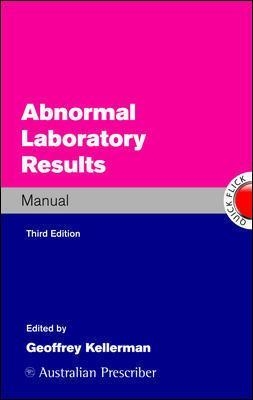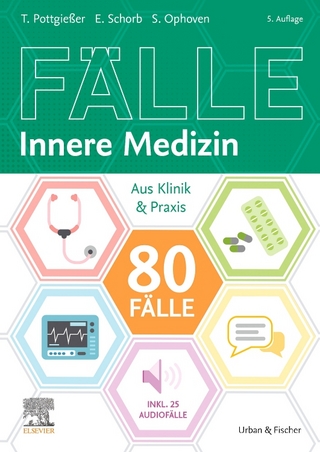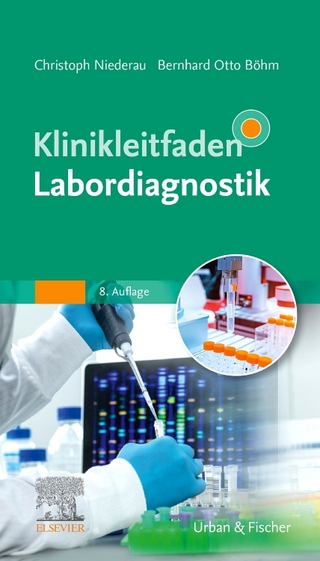
Abnormal Laboratory Results Manual
McGraw-Hill Education / Australia (Verlag)
978-0-07-099842-1 (ISBN)
- Titel z.Zt. nicht lieferbar
- Versandkostenfrei innerhalb Deutschlands
- Auch auf Rechnung
- Verfügbarkeit in der Filiale vor Ort prüfen
- Artikel merken
Abnormal Laboratory Results is a comprehensive collection of common abnormal test results which examine the dilemmas of abnormal tests and outlines how to approach them. Each test is analysed and interpreted in a structured, logical way and assessed in terms of its abnormal and normal reference range. The results are then presented in a variety of clinical contexts so an accurate prognosis and recommendations on management can be made. Each chapter was originally published as an article in the series titled Abnormal Laboratory Results by the journal Australian Prescriber
Key Features
13 completely new chapters
All previous chapters updated
PVC cover and two colour internals
New Book: Abnormal Laboratory Results, Geoffrey Kellerman from McGraw-Hill Education ANZ- Medical
Professor Geoffrey Milton Kellerman is currently Emeritus Professor of Biochemical Science at the University of Newcastle, where he has been based for almost 30 years. He specialises in clinical chemistry and is a visiting medical officer in clinical chemistry at the Hunter Area Health Service.
Abnormal Laboratory Results
Foreword
Preface to the third edition
Contributors
AcknowledgmentsPart 1 General Issues
1 What to do about abnormal laboratory results
2 Abnormal laboratory results
3 What does the reference range of a biochemical screen test mean?
4 Pitfalls in interpreting laboratory results
5 Moving beyond sensitivity and specificity: using likelihood ratios to help interpret diagnostic tests
6 Point-of-care testing comes of age in Australia
7 Urine testing Part 2 Biochemistry Tests
8 Plasma sodium
9 Serum potassium
10 Serum urea
11 Assessing renal function
12 Interpreting arterial blood gases
13 Calcium and vitamin D
14 Magnesium: the forgotten electrolyte
15 Hyperuricaemia
16 Liver function tests
17 Interpretation and significance of high blood cholesterol
18 Managing hyperlipidaemia: criteria for investigating lipids
19 New cardiac markers
20 B-type natriuretic peptide: a new diagnostic tool for congestive heart failure
21 Thyroid function tests
22 Evaluating adrenocortical function in adults
23 The glucose tolerance test
24 Diabetes monitoring: use of glycated haemoglobin and glycated protein assays
25 Fertility testing
26 Biochemical tests in pregnancy
27 Biochemical tests for abnormalities in pregnancy
28 Interpreting paediatric biochemistry results
29 Drug screens
30 Therapeutic drug monitoring: which drugs, why, when and how to do itPart 3 Haematology Tests
31 The red cells
32 Interpreting biochemical tests for iron deficiency: diagnostic difficulties imposed by the limitations of individual tests
33 Appropriate use of tests for folate and vitamin B deficiency
34 Screening for thalassaemia and haemoglobin variants
35 Investigations for thrombotic tendencies
36 Tests of haemostasis: detecting the patient at risk of bleeding
37 Abnormal haematology results in childrenPart 4 Microbiology Tests
38 Hepatitis B: laboratory diagnosis and vaccination
39 Hepatitis C: laboratory diagnosis and monitoring
40 HIV testing in Australia
41 Testing for sexually transmitted infections
42 Testing for Helicobacter pyloriPart 5 Immunology Tests
43 Screening for multiple myeloma
44 Testing cell-mediated immunity
45 Cell markers
46 Skin prick testing and in vitro assays for allergic sensitivity
47 Antinuclear antibodies (ANA)
48 Rheumatoid factor and anti-citrullinated peptide antibodyPart 6 Genetic Tests
49 BRCA testing for familial breast cancer
Index
| Zusatzinfo | Illustrations |
|---|---|
| Sprache | englisch |
| Maße | 110 x 170 mm |
| Gewicht | 364 g |
| Themenwelt | Medizin / Pharmazie ► Allgemeines / Lexika |
| Medizin / Pharmazie ► Medizinische Fachgebiete ► Urologie | |
| Studium ► 2. Studienabschnitt (Klinik) ► Anamnese / Körperliche Untersuchung | |
| Studium ► 2. Studienabschnitt (Klinik) ► Pathologie | |
| ISBN-10 | 0-07-099842-6 / 0070998426 |
| ISBN-13 | 978-0-07-099842-1 / 9780070998421 |
| Zustand | Neuware |
| Haben Sie eine Frage zum Produkt? |
aus dem Bereich


